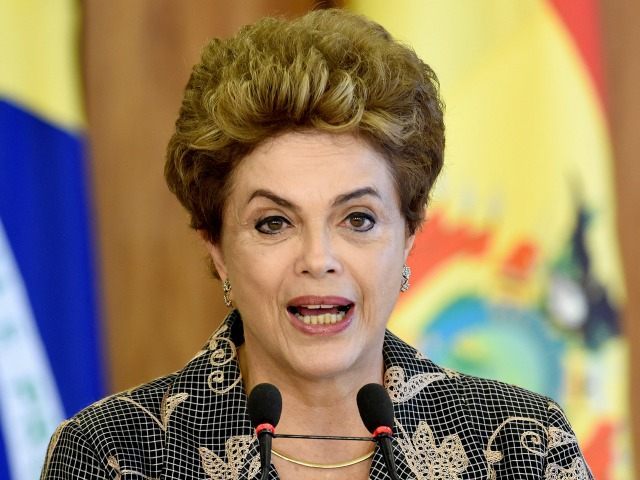President Dilma Rousseff of Brazil delivered a national primetime address on Wednesday night on the Zika virus pandemic that has hit the South American nation with particular severity, detailing how the Brazilian military has begun awareness and fumigation operations nationwide.
Unfortunately, in at least four major cities, residents would be hard-pressed to hear Rousseff’s address on their televisions over the cacophony of kitchenware being banged in protest out what appeared to be hundreds of windows in each location. The “panelaços,” as the protests are called, are intended to demand Rousseff step down from the presidency over an explosive corruption scandal that swept her administration last year.
Before assuming the presidency, Rousseff was in charge of the nation’s state-run oil corporation, Petrobras. During her tenure, a senior member of Petrobras’ corporate leadership was arrested and confessed to a money laundering scheme in which Petrobras would award contracts to corporations friendly to the ruling leftist Workers’ Party, in exchange for a 3 percent kickback for political campaigns. Rousseff was cleared of all wrongdoing, but many in Brazil believe it is impossible for her to not have known of this activity while in charge of the organization.
“Tonight, I will not talk about politics or economics,” Rousseff said on Wednesday, before updating the public on the various measures her government is taking to contain the Zika virus. As the Folha de Sao Paulo notes, her urging for the public to keep politics out of her speech last night was “to no avail.”
Hours before her speech, opponents on Twitter urged the public to “get the pots ready” to drown Rousseff’s speech out with noise.
“Dilma will appear on TV to talk about the Zika virus — you all know what to do!” the above poster reads.
For those too lazy to bang a pot, protesters provided a YouTube video to play out their windows, instead:
Residents in Sao Paulo, Belo Horizonte, Porto Alegre, and Rio de Janeiro – one of the cities most strongly affected by the Zika virus, as it is scheduled to be home to the 2016 Summer Olympics – recorded the sounds of protests from their windows. Below, footage from all four cities, respectively:
Some recorded their own personal protests at home while watching Rousseff’s address:
O Globo notes that, in Sao Paulo, people in traffic joined the protests by honking their horns. “Drivers stopped the cars in the street, especially in middle-class neighborhoods to protest,” the newspaper notes. While O Globo estimates the protests in Rio de Janeiro were more tame than during previous presidential addresses, Sao Paulo’s protests “repeated their intensity.”
The newspaper notes that, during her address, Rousseff asserted the Brazilian government had dispatched “a large army of peace and health” to raise awareness in Zika-affected neighborhoods, and gave “a special word of comfort” to the mothers of children affected by Zika: “We will do everything, absolutely everything that is in our power to protect them. We will do everything, absolutely everything, to support children affected by microcephaly and their families.”
Brazil has dispatched over 200,000 members of the military to Zika-affected areas to distribute insect repellant and teach locals how to prevent mosquito spawning nests from surfacing in their neighborhoods. The virus is spread through bites from the Aedes aegypti mosquito, which is prevalent throughout the continent; only Chile and Canada do not boast significant populations. While most Zika patients experience mild symptoms – up to 80 percent are asymptomatic – Brazilian researchers have found that a pregnant woman who contracts Zika has a far greater risk of delivering a child with microcephaly, a disorder in which an infant is born with a skull too small for his or her brain. Brazil has registered more than 4,000 cases of microcephaly suspected to have ties to Zika. Rio de Janeiro has begun recording a new cases of Zika every half hour.
A large number of people have the virus with no symptoms, so the situation is more serious than we can imagine,” Brazilian health minister Marcelo Castro told Reuters. “Our big hope is finding a vaccine.”
Brazilians have nonetheless appeared determined to continue with their daily lives. Thursday marks the official beginning of Carnaval, an annual parade festival that, while affected by the Zika pandemic, has not been canceled. Over the weekend, parade-goers used the event to raise awareness regarding how to avoid Zika, with a parade of Olympic gods singing for the Zika virus to go away.
Some have already begun to make light of the Zika virus, with one parody site joking that Wednesday’s panelaço “killed 127,000 mosquitos.”

COMMENTS
Please let us know if you're having issues with commenting.